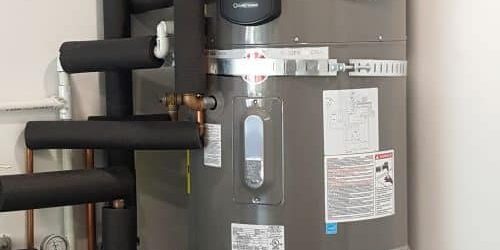When upgrading your home’s water heating system, it’s important to weigh all the options available to make the most efficient, cost-effective, and environmentally friendly choice. Two popular systems on the market today are heat pump water heaters (HPWH) and gas tankless water heaters. While both have their advantages, the heat pump water heater consistently stands out as a better long-term investment. Let’s dive into why.
1. Energy Efficiency: The Clear Winner
One of the most significant benefits of a heat pump water heater is its superior energy efficiency. HPWHs don’t generate heat directly—instead, they use electricity to transfer heat from the surrounding air to the water. This makes them 3 – 4 times more efficient than traditional electric water heaters, and 5 – 7 times more efficient than gas water heaters. How do they accomplish this; by using the ambient heat from the air, they dramatically reduce the amount of electricity needed to heat water.
In contrast, gas tanked, or tankless water heaters still rely on the combustion of natural gas to heat water on demand. While the tankless are more efficient than traditional gas water heaters (with efficiency ratings of 80-95%), they still waste energy through exhaust and heat loss during the combustion process. If you’re looking to cut down on energy use, the HPWH is the clear choice.
2. Operating Costs: Savings Over Time
Thanks to their energy efficiency, heat pump water heaters offer lower operating costs compared to gas tankless water heaters. While the initial cost of a HPWH might be higher, homeowners typically see significant savings on their utility bills over time. Depending on your location, these savings could add up to hundreds of dollars annually.
Gas tankless water heaters can provide some savings over their tanked counterparts, particularly for larger households that use a lot of hot water. However, gas prices fluctuate, and in regions where natural gas is expensive, the operating costs can still be higher than those of a heat pump system.
3. Environmental Impact: A Greener Choice
For homeowners focused on reducing their environmental footprint, the heat pump water heater is an environmentally friendly choice. Since HPWHs run on electricity, they can easily be paired with renewable energy sources like solar power or wind. This means they can potentially operate with zero carbon emissions, depending on your local energy grid.
In contrast, gas water heaters burn fossil fuels, contributing to greenhouse gas emissions. Even though they are efficient, they still have a direct environmental impact. Choosing a HPWH helps to lower your home’s carbon footprint and supports the transition to cleaner energy.
4. Long-Term Savings: A Smart Investment
While the upfront cost of a heat pump water heater is generally higher than a gas heater system, it’s important to think about the long-term picture. Over time, the energy savings from a HPWH typically outweigh the initial expense, providing substantial long-term savings on your energy bills. In addition, many regions offer rebates and incentives for homeowners who install energy-efficient systems like HPWHs, further reducing the cost of the system.
Gas tankless water heaters also offer long-term savings over traditional gas heaters, but the efficiency of HPWHs makes them the more economical choice in the long run, particularly as the cost of electricity from renewable sources continues to fall.
5. Performance and Reliability: Heating Water When You Need It
Both systems offer advantages when it comes to performance. Gas tankless water heaters are known for providing continuous hot water on demand (not instant hot water), making them great for households with high hot water usage. However, these systems can sometimes struggle with delivering a consistent temperature when multiple fixtures are being used simultaneously.
Then there is the dilemma of where do the hard water sediment deposits settle? With a tanked water heater (either gas or electric) the hard water sediment falls to the bottom of the tank and gets flushed out during its yearly maintenance service.
Heat pump water heaters, while incredibly efficient, may take a bit longer to heat water compared to gas models. However, many models now come with a hybrid mode that combines heat pump technology with traditional electric resistance heating to ensure there’s always enough hot water for your needs. In most cases, this makes the HPWH a reliable option for the average household.
6. Safety: An Added Bonus
Safety is another key factor to consider. Heat pump water heaters don’t use combustion, so there’s no risk of gas leaks or carbon monoxide poisoning. This makes them a safer option for homes, especially those without proper ventilation systems.
Also, there is no issue of back drafting the flue gases into the home, which is a common problem for all gas appliances when the house is depressurized from stronger venting appliances within the home. That is a huge problem in itself and needs to its own conversation.
Gas tankless water heaters, while generally safe, do require regular maintenance and proper ventilation to prevent dangerous gas buildup. Ensuring the system is working properly is crucial to avoid potential safety hazards.
7. Maintenance: Easy Upkeep
HPWHs generally require less maintenance than gas water heater systems. While it’s still important to perform routine inspections to ensure everything is functioning properly, the absence of combustion or a gas line means fewer components can wear down over time. Gas tankless water heaters, on the other hand, often need regular descaling (especially in areas with hard water) to prevent mineral buildup and must be inspected to ensure the venting system is clear and safe.
Conclusion: Why a Heat Pump Water Heater is the Better Choice
In terms of energy efficiency, cost savings, environmental impact, and safety, the heat pump water heater comes out ahead of the gas tanked and tankless water heaters. While both systems have their place, HPWHs are the better choice for homeowners looking to reduce energy usage, lower their carbon footprint, and save money over the long term.
As renewable energy sources continue to grow, the potential for HPWHs to operate on clean energy makes them an even more attractive option for the future. So, if you’re considering upgrading your home’s water heating system, a heat pump water heater is a smart, sustainable investment that will pay off in more ways than one.

